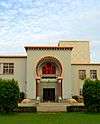Scientific Society of Aligarh
The Scientific Society of Aligarh was founded by Sir Syed Ahmed Khan in 1864.[1] In 1862 Syed formed a Translation Society which used to translate the scientific books of English and other European languages into Urdu and Hindi.[2] This society later evolved into the Scientific Society of Aligarh.[3][4] The society sought to promote liberal, modern education and Western scientific knowledge in the Muslim community in India.
Many of the essays he wrote during this time were on topics like the solar system, plant and animal life, human evolution, etc. In many ways, Sir Syed tried to bridge the gap between religion and science.
Jai Kishan Das, close Hindu associate of Sir Syed served as its secretary from 1867 till 1874.[2][5][6] He was also nominated as Co-President of The Society for life.[7]
The Aligarh Scientific Society had a library and a reading room of its own. The books were mainly donated to the Society by different Indian as well as foreign gentlemen.
Sir Syed himself donated a large number of books to the library. The Society subscribed to forty-four journals and magazines in 1866. Of those, 18 were in English and rest in Urdu, Persian, Arabic and Sanskrit. It exchanged its publication with similar societies like the Society for the Diffusion of Useful Knowledge founded by Pandit Harsokh Rai at Lahore and the Mohammedan Library Society founded by Moulvi Abdul Lateef Khan at Calcutta. It also exchanged its journal with the publications of the Bengal Asiatic Society, Calcutta.[8]
Aligarh Institute Gazette was the journal of the society.[9]
References
Notes
- Arnold P. Kaminsky, Roger D. Long (2011). India Today: An Encyclopedia of Life in the Republic Vol 1. ABC-CLIO. p. 26. ISBN 9780313374630.
- "Remembering Sir Syed Ahmed Khan, the great educationist and secular nationalist". India TV News. 2015-10-17. Retrieved 2015-10-17.
- Om Prakash Sharma (1962). Trends in Scientific Terminology. National Bureau of Educational Publications.
- Hafeez Malik (1993). Political Profile of Sir Sayyid Ahmad Khan: A Documentary Record. Adam Publishers. p. 21. ISBN 9788174351029.
- Dildār ʻAlī Farmān Fatiḥpūrī; Dild−ar ʻAl−i Farm−an Fatiḥp−ur−i (1987). Pakistan movement and Hindi-Urdu conflict. Sang-e-Meel Publications.
- Muhammad Moj (1 March 2015). The Deoband Madrassah Movement: Countercultural Trends and Tendencies. Anthem Press. pp. 47–. ISBN 978-1-78308-388-6.
- Fatiḥpūrī, Dildār ʻAlī Farmān; Fatiḥp−ur−i, Dild-ar ʻAl−i Farm−an (1987-01-01). Pakistan movement and Hindi-Urdu conflict. Sang-e-Meel Publications.
- (PDF) http://nptel.ac.in/courses/109103024/pdf/module5/SM%20Lec%2026.pdf. Cite journal requires
|journal=(help); Missing or empty|title=(help) - Moj, Muhammad (2015-03-01). The Deoband Madrassah Movement: Countercultural Trends and Tendencies. Anthem Press. ISBN 9781783083886.
